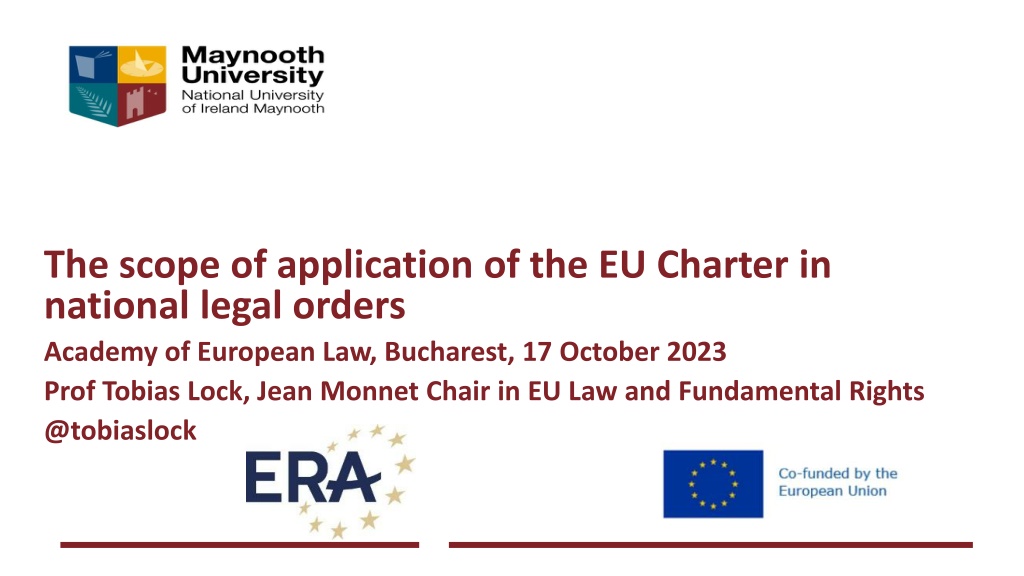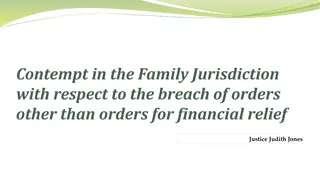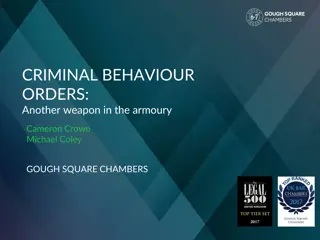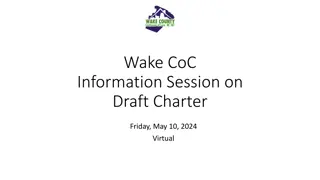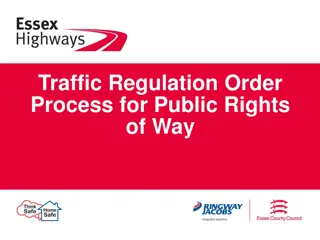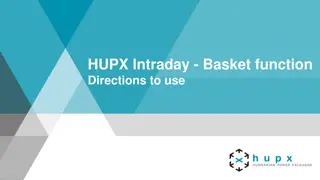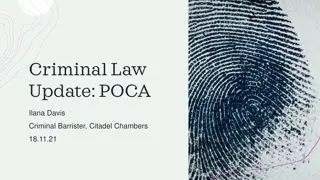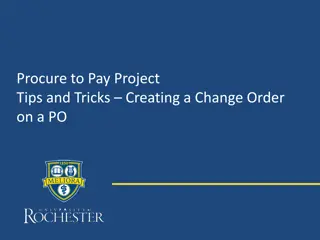The scope of application of the EU Charter in national legal orders
This presentation by Prof. Tobias Lock discusses the scope of application of the EU Charter in national legal orders, focusing on the field of application of the Charter, implementation of EU law, simple cases, and the broad interpretation of the scope of EU law. It explains how the Charter applies to the EU and Member States, emphasizing the importance of invoking the Charter before Member States' courts for compliance with EU law, affecting the outcomes of domestic proceedings.
Download Presentation

Please find below an Image/Link to download the presentation.
The content on the website is provided AS IS for your information and personal use only. It may not be sold, licensed, or shared on other websites without obtaining consent from the author. Download presentation by click this link. If you encounter any issues during the download, it is possible that the publisher has removed the file from their server.
E N D
Presentation Transcript
The scope of application of the EU Charter in national legal orders Academy of European Law, Bucharest, 17 October 2023 Prof Tobias Lock, Jean Monnet Chair in EU Law and Fundamental Rights @tobiaslock
Overview 1. Field of application of the Charter: Article 51 (1) CFR 4. The Scope of EU Law 5. Simple Cases 2. Implementing EU Law 6. Discretion 3. Implementing EU Law: Criteria 7. Broad Interpretation of the Scope of EU Law maynoothuniversity.ie
Warm-up question POLL Have you ever applied the EU Charter of Fundamental Rights in your judicial practice? maynoothuniversity.ie
The Charter: field of application Article 51 (1) CFR The provisions of this Charter are addressed to the institutions, bodies, offices and agencies of the Union with due regard for the principle of subsidiarity and to the Member States only when they are implementing Union law. They shall therefore respect the rights, observe the principles and promote the application thereof in accordance with their respective powers and respecting the limits of the powers of the Union as conferred on it in the Treaties. Charter therefore always applies to the EU but only applies to the MS when implementing EU law maynoothuniversity.ie
The Charter: field of application Why does it matter if the Charter is addressed to the Member States ? It means that Charter can be invoked before a MS court. The MS court is therefore obliged to consider compliance of the MS measure in question with the Charter. If the MS court finds non-compliance with the Charter, the doctrine of primacy of EU law means that any MS court is obliged to disapply contravening domestic law (no matter what status it has). Thus question whether Charter applies or not may determine the outcome of domestic proceedings. maynoothuniversity.ie
Implementing Union Law What does implementing mean? Explanations to the Charter: when MS are acting in the scope of EU law Reference to two pre-Charter cases Case 5/88 Wachauf: where national authorities act as agents of the EU: implementation/application of EU law Case C-260/89 ERT: where MS derogates from EU law, in particular free movement rights Possible reasons e.g. public policy, public security, public health (contained in derogation provisions) maynoothuniversity.ie
Implementing Union Law Leading Case: C-617/10 klagaren vHans kerberg Fransson fisherman prosecuted for income tax fraud, VAT fraud, and social security fraud had already been given an administrative fine by the tax authorities now being criminally prosecuted Does this violate his right under Article 50 CFR (ne bis in idem)? No one shall be liable to be tried or punished again in criminal proceedings for an offence for which he or she has already been finally acquitted or convicted within the Union in accordance with the law. maynoothuniversity.ie
Implementing Union Law POLL Does the Charter apply in Case C-617/10 klagaren vHans kerberg Fransson ? maynoothuniversity.ie
Implementing Union Law ECJ: Charter applies so far as the VAT fraud is concerned Question is: is the case within the scope of EU law , because pre-Charter case law (Case 5/88 Wachauf) this is what the Charter explanations say Is the case in the scope of EU law? as far as income tax fraud and social security fraud are concerned: no VAT fraud? - YES VAT Directives: these require MS to take all legislative and administrative measures appropriate for ensuring collection of all the VAT due on its territory and for preventing evasion Article 325 TFEU obliges MS to counter illegal activities affecting the interests of the EU EU receives a share of VAT revenue so that VAT fraud affects its interests maynoothuniversity.ie
Implementing Union Law Case C-390/12 Pfleger Facts: prohibition of games of chance in Austria authorities seized gaming machines and imposed fines on the operators interference with freedom to provide services and also Charter rights? in particular right to conduct a business and right to property (Art 15-17 CFR)? Court: Charter applies where national legislation falls within the scope of EU law It follows that where a Member State relies on overriding requirements in the public interest in order to justify rules which are liable to obstruct the exercise of the freedom to provide services, such justification, provided for by EU law, must be interpreted in the light of the general principles of EU law, in particular the fundamental rights henceforth guaranteed by the Charter . maynoothuniversity.ie
Implementing Union Law Consequences of Fransson and Pfleger: implementing EU law = within the scope of EU law two situations: MS applies EU law/carries out duties under it MS deviates from fundamental freedoms (see Case C-390/12) The Charter applies, where EU law applies Consequence: Charter applies with full force of EU law (primacy) this implies that domestic cases may need to be split up as far as fundamental rights protection is concerned parts of the case fall within the scope of the Charter others don t (as we had in Fransson) maynoothuniversity.ie
Implementing EU Law: criteria Case C-206/13 Siragusa constructed buildings without planning permission and was ordered to remove them challenge in the Italian courts; invoked Article 17 CFR (right to property) Is this case within the scope of EU law? In order to determine whether national legislation involves the implementation of EU law for the purposes of Article 51 of the Charter, some of the points to be determined are whether that legislation is intended to implement a provision of EU law; the nature of that legislation and whether it pursues objectives other than those covered by EU law, even if it is capable of indirectly affecting EU law; and also whether there are specific rules of EU law on the matter or capable of affecting it maynoothuniversity.ie
Implementing EU Law: criteria Case C-206/13 Siragusa in this case: there was no connection to EU law whatsoever the applicant invoked numerous EU environmental law provisions, but none of them had been relied upon by the national authority when making the removal order hence: not within the scope of EU law maynoothuniversity.ie
Straightforward situations Simple cases: A MS measure is adopted on the basis of EU law e.g. a decision to return an asylum seeker to the Member State responsible under the Dublin Regulation (604/2013; take back request ), e.g. Joined Cases C-411/10 and C-493/10 NS and ME A MS measure is adopted on the basis of MS legislation transposing an EU Directive or Framework Decision e.g. arrest/surrender on the basis of a European Arrest Warrant e.g. Joined Cases C-404/15 and C-659/15 PPU Aranyosi and C ld raru maynoothuniversity.ie
EU legislative competence = irrelevant Not relevant: whether the EU or the MS have competence to legislate in a particular area Applicability of the Charter even if MS legislative competence: MS are acting in the scope of EU law when using MS competences, but deviating from EU free movement law e.g. Case C-208/09 Sayn-Wittgenstein MS rules on names (which names are permissible etc) are a MS competence, but must still comply with EU law constraints (notably: EU citizenship law) Equally: Charter sometimes not applicable where EU legislative competence exists Also: [T]he mere fact that a national measure comes within an area in which the European Union has powers cannot bring it within the scope of EU law. , Case C-198/13 Hern ndez maynoothuniversity.ie
MS Discretion I: as defined by national law Case C-571/10 Kamberaj Article 11(1) of Directive 2003/109 (Long-term residents directive) Long-term residents shall enjoy equal treatment with nationals as regards: (d) social security, social assistance and social protection as defined by national law 80. when determining the social security, social assistance and social protection measures defined by their national law and subject to the principle of equal treatment enshrined in Article 11(1)(d) of Directive 2003/109, the Member States must comply with the rights and observe the principles provided for under the Charter, including those laid down in Article 34 thereof. maynoothuniversity.ie
MS Discretion II: MS may provide for Case C-329/13 Stefan Flooding caused by negligent operation of locks. Lock keeper investigated criminally. Stefan (member of the public) sought information on rainfall, authorities refused, to preserve integrity of criminal trial. Argument: this is contrary to Art 47 CFR. Article 4.2 of Directive 2003/4 (access to environmental info): exceptions Member States may provide for a request for environmental information to be refused if disclosure of the information would adversely affect: (c) the course of justice, the ability of any person to receive a fair trial ... Court: that discretion must be exercised in compliance with Article 47 CFR. maynoothuniversity.ie
Examples of situations outside the scope of EU law Case C-483/12, Pelckmans Turnhout Do restrictions on shop opening hours on Sundays violate the Charter? Court: outside the scope of EU law free movement of goods does not apply (long-standing case law since Joined Cases C-267/91 and 268/91 Keck and Mithouard) Case C-198/13 Hern ndez: shall not affect clause in a Directive i.e. clause saying that the Directive shall not affect the option of Member States to apply or introduce laws [ ] which are more favourable Presumably this also means that the Charter does not apply where EU Treaties expressly do not apply, e.g. Article 45 (4) TFEU maynoothuniversity.ie
Consequence: procedural rights Consequence of the Charter applying: Specific substantive fundamental rights apply (e.g. Article 7 private and family life) But more importantly perhaps: domestic procedure must be compliant with Article 47-50 CFR if the case is in the scope of EU law e.g. cases seeking an EU law remedy (e.g. state liability): Case C-279/09 DEB European Arrest Warrant cases (e.g. Case C-216/18 PPU LM) Brussels Regulation cases Data protection cases EU free movement law etc maynoothuniversity.ie
Conclusion If a party requests you to apply the Charter/request a preliminary ruling, enquire what norm of EU law is decisive in the case. If the party points to the Charter, inquire - what OTHER norm of EU law applies to the case, or at least - which domestic measure that the party wants set aside comes within the scope of OTHER norms of EU law. Use the Siragusa checklist (as an indicator) maynoothuniversity.ie
Discussion maynoothuniversity.ie
